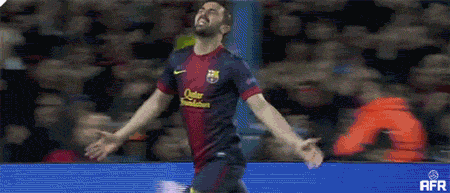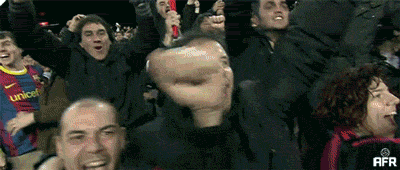Sometimes, things fall exactly where they should
Sometimes, things fall exactly where they should


The stats didn’t give Barcelona much of a chance. The oddsmakers turned on them. The people criticized the club, virtually preparing for their burial. No team had managed to overturn a two-goal deficit in the Champions League without the benefit of an away goal. Barcelona had never capsized a 2-0 deficit in Europe. And Lionel Messi had never scored against an Italian club from open play. Not often do Barca, and Messi, need a game to silence critics, but if there ever was one, it happened Tuesday night.
Presumably, only Barca could’ve played so confidently with all that racket. They’re so strong-willed. They didn’t want any negative energy: come support us or go home, Gerard Pique insisted. And just when some were starting to believe they were losing their lustre — they had lost, before the second leg against AC Milan, three of five games — the Catalans put on a performance to remind the world they are still capable of greatness.
This was not just a case of Barca being Barca. Jordi Roura said so. “Beating Milan 4-0 is not normal for anyone, not even Barcelona. They are a great team and made life very difficult for us,” the club’s assistant manager told reporters. The match was much more than a blowout. It was a game of stark conclusions, one in which we saw true reflections of both clubs: that Barcelona can still play, and that Milan still have much work to do.
Messi needed five minutes to dazzle Milan — his first goal a product of a swift set of passing, two quick touches, a slight change in direction and a diabolically accurate shot into the top corner. And even though he has scored in 17 straight La Liga matches, this one was different. So was the next one, a slippery shot off a horizontal run parallel to the outer edge of the box. He passed Ruud van Nistelrooy on the all-time Champions League scoring chart, sitting solely in second. Only Messi, now with 53 goals to his name this season and 33 tallies in his past 32 appearances in Europe, could be criticized after scoring just three times in those five games prior to this fateful European night at Camp Nou.
But if the devastating beauty of his goals didn’t signal a change in opinion, then the results did: finally, goals against Italian opponents; again, goals on a big stage; and yes, a reason to believe he is still the best. It’s hard to imagine just a few weeks of mediocre play could downgrade his status so comprehensively.
Messi had only scored penalties before against Milan — three of them — and he had slipped into obscurity in the first leg three weeks ago. Maybe the 25-year-old could only score regularly against lesser Spanish foes. Maybe, had he played in Italy, he’d have scored fewer.
The answer is no.
Even against a remarkably poor Milan in this second leg, Messi showed he can beat into submission opposition of all creeds, denominations and ethnicities. Italy had been the only territory he hadn’t conquered. Now, he’s battered teams from England, from all over the Iberian and Mediterranean peninsulas, from Germany and the Slavic peoples. Messi’s influence truly knows no geographic boundaries. One image will always last: the little Argentine, on his first goal, surrounded by five Milan defenders, bouncing the ball off teammate Andres Iniesta, manoeuvring within the equivalent of a parking space, scoring.
He’s no Messiah, no deity, but Messi is a better player for doing it. And for someone whose standards remain peerlessly high, it is remarkable that he can be considered better than he already was: a man with four Ballons d’Or, three Champions League medals, and dozens of titles.
Barcelona, like a dog feeding off the energy of its owner, then perked up and delivered the rest. Messi is still a beacon of confidence for them. If he plays well, the wins will come. Just as quickly as they had lost that sheen of theirs, they got it back. The Catalans registered against Milan their second straight clean sheet in all competitions after going 13 games without one.
Talk of their demise was a discussion no one should have had. Roura was, after all, right. Barcelona tend to suffer a dip in quality, in fitness, in mental strength, during the month of February. The best of dynasties don’t win every battle, but often pick the right ones to win the war. Barcelona have done this: they hold a 13-point lead in La Liga, clear of any threat, and now have the luxury of focusing their concentration on the European prize. It’d be of great importance for Barca to deny Real Madrid of a 10th European Cup, and after losing to them in the Copa del Rey — a tournament Barca don’t seem to fancy — there’s much more for Barcelona to achieve.

Because, you see, had Milan kicked them out, the rest Barca’s season would have lost all meaning. The win wasn’t so much historic as it was necessary. No one will remember the little feats they accomplished, being the first Barcelona side to make such a comeback. Many will remember what they do from now. They will most certainly win La Liga, and if they can win a fourth Champions League title in eight years, well, they’d have quite a hegemonic rule over this era.
Then there is the club trying to start a generation of their own. And while they looked every bit the unexpected party crasher in a 2-0 win over Barcelona on February 20, Milan fell hard down the staircase of reality on Tuesday. Inexperience was the name of Milan’s problem, and those who were experienced let them down. After the match, Milan midfielder Mathieu Flamini admitted the players were “nervous.” And you could tell they were. They shied away from the occasion, losing the ball almost immediately after they’d get it. When they looked to their captain, Massimo Ambrosini, they saw a 35-year-old man with 19 seasons of know-how playing scared. A captain is supposed to inspire, supposed to lead by example, supposed to calm and direct the flock like a shepherd. Ambrosini did none of those. He coughed up the ball and almost never knew what to do with it.
And so the dominos fell: not a single one in uniform played with the composure and confidence that so convincingly and deservingly beat Barcelona weeks before. Was there a reason for the team’s timidity? If anything, Milan had reasons for encouragement: they had lost just once in the previous 11 games in all competitions, and won eight of them. They are the hottest team in Serie A, but, as the fact came to the fore this week, they are also one of the youngest. “The experience will serve us in the future,” manager Max Allegri told reporters. “The process of building this side does not stop if we lose.” And that is true. But the performance, or lack thereof, left so much to be desired.
There is something Allegri just can’t out of his players, even if, as Milan’s leading scorer Stephan El Shaarawy told Sky Sport Italia, the manager “prepared us very well for this match. He told us not to be hasty, to be patient and wait for the right moment. We studied Barcelona.” Sometimes, the test is too great, but the trend has been all too familiar at this point in the competition.
Under Allegri, the second leg has been a graveyard for Milan’s hopes of advancing. This loss to Barca was the third straight instance, and fourth in the past four years, in which Milan have conceded three goals or more without answer in the return leg of a Champions League knockout stage. The only other time in that span, Milan needed at least a goal against Tottenham at White Hart Lane to have a chance of advancing in 2011 from their last-16 tie but put up little fight in a 0-0 draw that eliminated them. If Milan are preparing to be something better — a financially responsible club, a grassroots organization, a young team with direction — they need a manager who can coax the best out of them when the stage calls for more. They need a captain who won’t shake to the core in the face of, yes, one of the best teams the world has seen. They need someone to harness all that youthful exuberance.
M’Baye Niang, the 18-year-old who played in place of the injured Giampaolo Pazzini, never should have faced such a daunting task — scoring at Camp Nou — as a teenager. But he did, and he hit the post. Niang says he wasn’t afraid — “I thought about [hitting the post] once,” he later told reporters, “but five minutes later I had forgotten it” — but he showed that he was simply not ready for the moment.
There have been triumphs in the league since Allegri has arrived, defeating Inter Milan and Juventus, just none of the enduring kind. And in Europe Milan’s confidence has worn out quickly, like acid eating metal. They played so well before against Barcelona, but left the Champions League with a whimper. They scrambled for the ball. They invited Barca into their 18-yard box. They didn’t take their opportunities. They collapsed. This is a club, lately, that’s done things no one expected and done nothing when expected to do things. If there’s a change in policy at the club, there must be a change in mentality, too.
For Barcelona, there is no such alarm ringing any longer. They’ve restored order to the complex. It took a few games to question them, but only one to realize that, yeah, this team has still got what it takes. And maybe we were all fools to think otherwise.
Anthony Lopopolo is a regular contributor to AFR, with an expertise in Italian calcio and European football. You can follow him on Twitter at @SportsCaddy. Comments below please.







